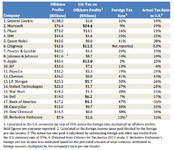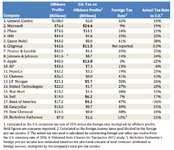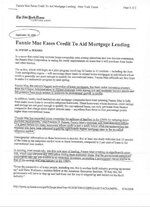- Messages
- 6,244
- Reactions
- 7,103
The International Monetary Fund Lays The Groundwork For Global Wealth Confiscation
In this handout provided by the International Monetary Fund (IMF), International Monetary Fund Deputy Director Michael Keen presents the Fiscal Monitor Press Conference October 9, 2013 at the IMF Headquarters in Washington, DC. The report said that emerging-market governments were at economic risk.
The International Monetary Fund (IMF) quietly dropped a bomb in its October Fiscal Monitor Report. Titled "Taxing Times," the report paints a dire picture for advanced economies with high debts that fail to aggressively "mobilize domestic revenue." It goes on to build a case for drastic measures and recommends a series of escalating income and consumption tax increases culminating in the direct confiscation of assets.
Yes, you read that right. But don't take it from me. The report itself says:
"The sharp deterioration of the public finances in many countries has revived interest in a "capital levy"— a one-off tax on private wealth—as an exceptional measure to restore debt sustainability. The appeal is that such a tax, if it is implemented before avoidance is possible and there is a belief that it will never be repeated, does not distort behavior (and may be seen by some as fair). ... The conditions for success are strong, but also need to be weighed against the risks of the alternatives, which include repudiating public debt or inflating it away. ... The tax rates needed to bring down public debt to precrisis levels, moreover, are sizable: reducing debt ratios to end-2007 levels would require (for a sample of 15 euro area countries) a tax rate of about 10 percent on households with positive net wealth. (page 49)"
Note three takeaways. First, IMF economists know there are not enough rich people to fund today's governments even if 100 percent of the assets of the 1 percent were expropriated. That means that all households with positive net wealth—everyone with retirement savings or home equity—would have their assets plundered under the IMF's formulation.
Second, such a repudiation of private property will not pay off Western governments' debts or fund budgets going forward. It will merely "restore debt sustainability," allowing free-spending sovereigns to keep tapping the bond markets until the next crisis comes along—for which stronger measures will be required, of course.
Third, should politicians fail to muster the courage to engage in this kind of wholesale robbery, the only alternative scenario the IMF posits is public debt repudiation and hyperinflation. Structural reform proposals for the Ponzi-scheme entitlement programs that are bankrupting us are nowhere to be seen.
If ever there were a roadmap for prompting massive capital flight and emigration of productive citizens toward capitalism's nascent frontiers in Asia, this is it.
"The IMF justifies its tax increases by highlighting trends in income inequality along with a claimed decline in the progressivity of most income tax regimes. Using "perceived equity" (otherwise known as "envy") as the key metric motivating tax policy, the report intentionally conflates tax rates with tax revenue, lamenting a decline in the top marginal income tax rates paid by the highest earners. Never mind that these high earners have been forking over more money, a higher percentage of their gross income, and a larger share of aggregate national tax revenue in recent years. It also ignores the Laffer Curve effects that are clearly visible in the data. As for incentive, the report pays no heed to the idea that wealth and income can only be taxed if someone is motivated to create it."
The report's most chilling aspect is the clinical manner in which it discusses how to restrict the mobility of the rich, along with the inconvenience of factoring in their "well being." Again, to quote the report:
"Financial wealth is mobile, and so, ultimately, are people. ... There may be a case for taxing different forms of wealth differently according to their mobility ... Substantial progress likely requires enhanced international cooperation to make it harder for the very well-off to evade taxation by placing funds elsewhere.
"A revenue-maximizing approach to taxing the rich effectively puts a weight of zero on their well-being—contentious, to say the least. What then if some weight is indeed attached to the well-being of the richest? Figure 19 provides a way to think about the trade-off between equity and efficiency considerations in setting the top marginal rate in that case. ... If one attaches less weight to those with the highest incomes, the vote would be to increase the top marginal rate."
Yes, this is where the bankruptcy of the modern entitlement state is taking us—capital controls and exit restrictions so the proverbial four wolves and a lamb can vote on what's for dinner. That's the only way to keep citizens worried about ending up on the menu from voting with their feet. Again, straight from the report:
"There is a surprisingly large amount of experience to draw on, as such levies were widely adopted in Europe after World War I."
In this handout provided by the International Monetary Fund (IMF), International Monetary Fund Deputy Director Michael Keen presents the Fiscal Monitor Press Conference October 9, 2013 at the IMF Headquarters in Washington, DC. The report said that emerging-market governments were at economic risk.
The International Monetary Fund (IMF) quietly dropped a bomb in its October Fiscal Monitor Report. Titled "Taxing Times," the report paints a dire picture for advanced economies with high debts that fail to aggressively "mobilize domestic revenue." It goes on to build a case for drastic measures and recommends a series of escalating income and consumption tax increases culminating in the direct confiscation of assets.
Yes, you read that right. But don't take it from me. The report itself says:
"The sharp deterioration of the public finances in many countries has revived interest in a "capital levy"— a one-off tax on private wealth—as an exceptional measure to restore debt sustainability. The appeal is that such a tax, if it is implemented before avoidance is possible and there is a belief that it will never be repeated, does not distort behavior (and may be seen by some as fair). ... The conditions for success are strong, but also need to be weighed against the risks of the alternatives, which include repudiating public debt or inflating it away. ... The tax rates needed to bring down public debt to precrisis levels, moreover, are sizable: reducing debt ratios to end-2007 levels would require (for a sample of 15 euro area countries) a tax rate of about 10 percent on households with positive net wealth. (page 49)"
Note three takeaways. First, IMF economists know there are not enough rich people to fund today's governments even if 100 percent of the assets of the 1 percent were expropriated. That means that all households with positive net wealth—everyone with retirement savings or home equity—would have their assets plundered under the IMF's formulation.
Second, such a repudiation of private property will not pay off Western governments' debts or fund budgets going forward. It will merely "restore debt sustainability," allowing free-spending sovereigns to keep tapping the bond markets until the next crisis comes along—for which stronger measures will be required, of course.
Third, should politicians fail to muster the courage to engage in this kind of wholesale robbery, the only alternative scenario the IMF posits is public debt repudiation and hyperinflation. Structural reform proposals for the Ponzi-scheme entitlement programs that are bankrupting us are nowhere to be seen.
If ever there were a roadmap for prompting massive capital flight and emigration of productive citizens toward capitalism's nascent frontiers in Asia, this is it.
"The IMF justifies its tax increases by highlighting trends in income inequality along with a claimed decline in the progressivity of most income tax regimes. Using "perceived equity" (otherwise known as "envy") as the key metric motivating tax policy, the report intentionally conflates tax rates with tax revenue, lamenting a decline in the top marginal income tax rates paid by the highest earners. Never mind that these high earners have been forking over more money, a higher percentage of their gross income, and a larger share of aggregate national tax revenue in recent years. It also ignores the Laffer Curve effects that are clearly visible in the data. As for incentive, the report pays no heed to the idea that wealth and income can only be taxed if someone is motivated to create it."
The report's most chilling aspect is the clinical manner in which it discusses how to restrict the mobility of the rich, along with the inconvenience of factoring in their "well being." Again, to quote the report:
"Financial wealth is mobile, and so, ultimately, are people. ... There may be a case for taxing different forms of wealth differently according to their mobility ... Substantial progress likely requires enhanced international cooperation to make it harder for the very well-off to evade taxation by placing funds elsewhere.
"A revenue-maximizing approach to taxing the rich effectively puts a weight of zero on their well-being—contentious, to say the least. What then if some weight is indeed attached to the well-being of the richest? Figure 19 provides a way to think about the trade-off between equity and efficiency considerations in setting the top marginal rate in that case. ... If one attaches less weight to those with the highest incomes, the vote would be to increase the top marginal rate."
Yes, this is where the bankruptcy of the modern entitlement state is taking us—capital controls and exit restrictions so the proverbial four wolves and a lamb can vote on what's for dinner. That's the only way to keep citizens worried about ending up on the menu from voting with their feet. Again, straight from the report:
"There is a surprisingly large amount of experience to draw on, as such levies were widely adopted in Europe after World War I."














